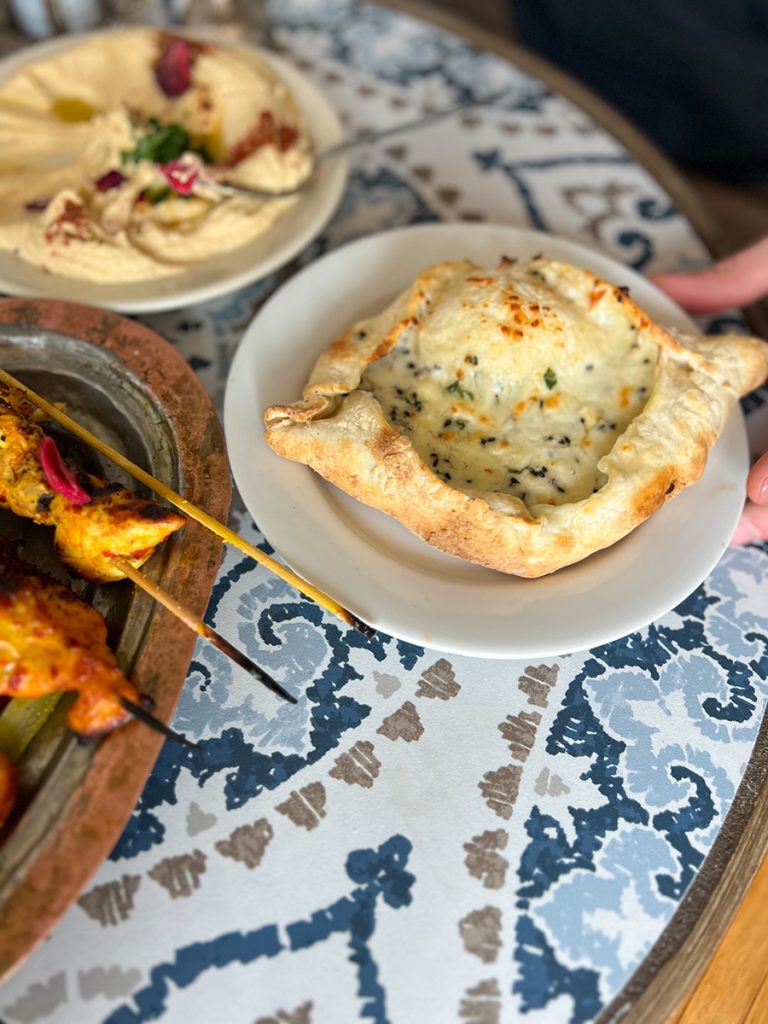
Forget your passport — I just traveled 5,500 miles from Rhode Island to Syria with nothing but a fork and a sweet tooth. In a cozy corner of Providence, where college students usually hunt for pizza slices, I found myself in an unexpected portal to Aleppo. One minute I was in New England, the next I was transported across continents by the extraordinary flavors crafted by Youssef Akhtarini, the virtuoso of baklava, and the team at Aleppo Sweets. Before delighting Rhode Islanders, Akhtarini was a master baker in Aleppo, Syria, where, by the age of 24, he owned his first bakery. His life story unfolds like a well-crafted recipe: Begin with exceptional talent, add the bitter challenge of displacement, fold in determination, and finish with the sweet satisfaction of rebuilding his legacy in Providence. The result? A remarkable blend of Syrian tradition and American opportunity, served fresh daily.
Immersed in Tradition
The atmosphere at Aleppo Sweets is as carefully crafted as its menu. The moment you walk in, you’re greeted by an impressive display of traditional copper and brass coffee pots arranged on turquoise-backed shelves — dozens of dallah pots with their distinctive curved spouts and long handles standing like sentinels of heritage. This isn’t mere decoration; it’s a museum-worthy collection that connects diners to centuries of Middle Eastern hospitality traditions. The dining area features intricately carved wooden chairs with lattice details that could have been plucked straight from a Damascus courtyard. Adorned with vibrant kilim-style cushions in rich reds and blues, they invite you to settle in by large windows framed by elegant drapes. Small hexagonal side tables inlaid with mother-of-pearl patterns offer the perfect perch for sweet mint tea served in delicate glassware.
The Art of Mezze: Sharing Traditions
Long before shared plates became a dining trend elsewhere, Syrian culture perfected mezze — the art of communal eating that brings people together around small, flavorful dishes. At Aleppo Sweets, this tradition comes alive with exceptional authenticity. The baba ghanoush arrived with a perfect smoky scent. Beside it sat hummus of remarkable silkiness and complexity — a reminder that this beloved dish has centuries of culinary heritage behind it. Each dip is artfully finished with verdant olive oil pools, sprinkles of sumac’s deep red, and bright flecks of parsley. The chicken kebab arrived on a rustic metal serving dish accompanied by pickled cabbage in a brilliant magenta that added color, contrast, and tangy flavor balance. On slender wooden skewers, the charred meat looked as beautiful as it tasted — tender, and perfectly seasoned.
The Crown Jewel: Cheese Fatayer (Or: How I Found True Love in Boat-Shaped Bread)
Just when I thought I had picked my favorite dish, the cheese fatayer made a grand entrance. This Syrian Street food might look unassuming, but one bite reveals why it’s been a beloved staple for generations. Think of it as culinary magic: ordinary cheese and dough transformed into extraordinary flavor through a secret formula of tradition, technique, and tender loving care. The bread, shaped like a tiny edible canoe, carries precious cargo: cheese that’s been delicately infused with herbs and a whisper of garlic that enhances, rather than dominates, the creamy filling. The crust deserves its own TED Talk on texture — somehow achieving that perfect balance between delicate and sturdy, like a master architect who’s also a poet. One bite and I understood why Syrians have been eating these on-the-go for generations.
Baklava: Where Phyllo Gets Philosophical
The baklava at Aleppo Sweets redefined my expectations entirely. Each of the four varieties I sampled revealed pastry perfection — delicate phyllo that shatters just so, precisely crushed pistachios, and syrup that infuses without sogginess. This is baklava that makes other versions hang their honey-soaked heads in shame. What makes these sweets truly special is that they carry Akhtarini’s culinary heritage across continents. The recipes survived his journey from war-torn Syria to Providence, where they now offer diners a taste of something genuinely otherworldly. In each carefully constructed layer lies a profound truth about resilience, tradition, and the sweet persistence of cultural identity — philosophy you can taste.
Arab Heritage Month: Where Taste Buds Get Passports
Arab Heritage Month offers the perfect opportunity to explore the rich culinary traditions that span from Morocco to Iraq, from Egypt to Lebanon. While these cuisines share some common elements, each brings its own distinct flavors and techniques to the table — whether it’s the seafood-forward dishes of Tunisia, the aromatic rice dishes of the Gulf states, the za’atar-infused breads of Lebanon, or the subtle spice blends of Yemeni cooking. At Aleppo Sweets, Syria’s contribution to this diverse tapestry comes alive. The restaurant’s beautiful décor, with its ornate brass coffee pots and carved wooden chairs, creates an authentic backdrop for a cultural journey through food. This Arab Heritage Month, consider letting your taste buds be your tour guide. After all, food has always been one of the most accessible and enjoyable ways to experience another culture — no passport required. •